Atticus SAETHER
Atticus Saether is a freshman at the Liberal Arts and Science Academy. He has a fully committed love for music and even plays the bass in his own band called “Rising Ivy” with a couple of his friends. He is also in LASA’s band and enjoys being apart of such a fun music community. Atticus is also very passionate about cooking. He often enjoys trying new and odd recipes in his free time.

Texas Tastings | 4
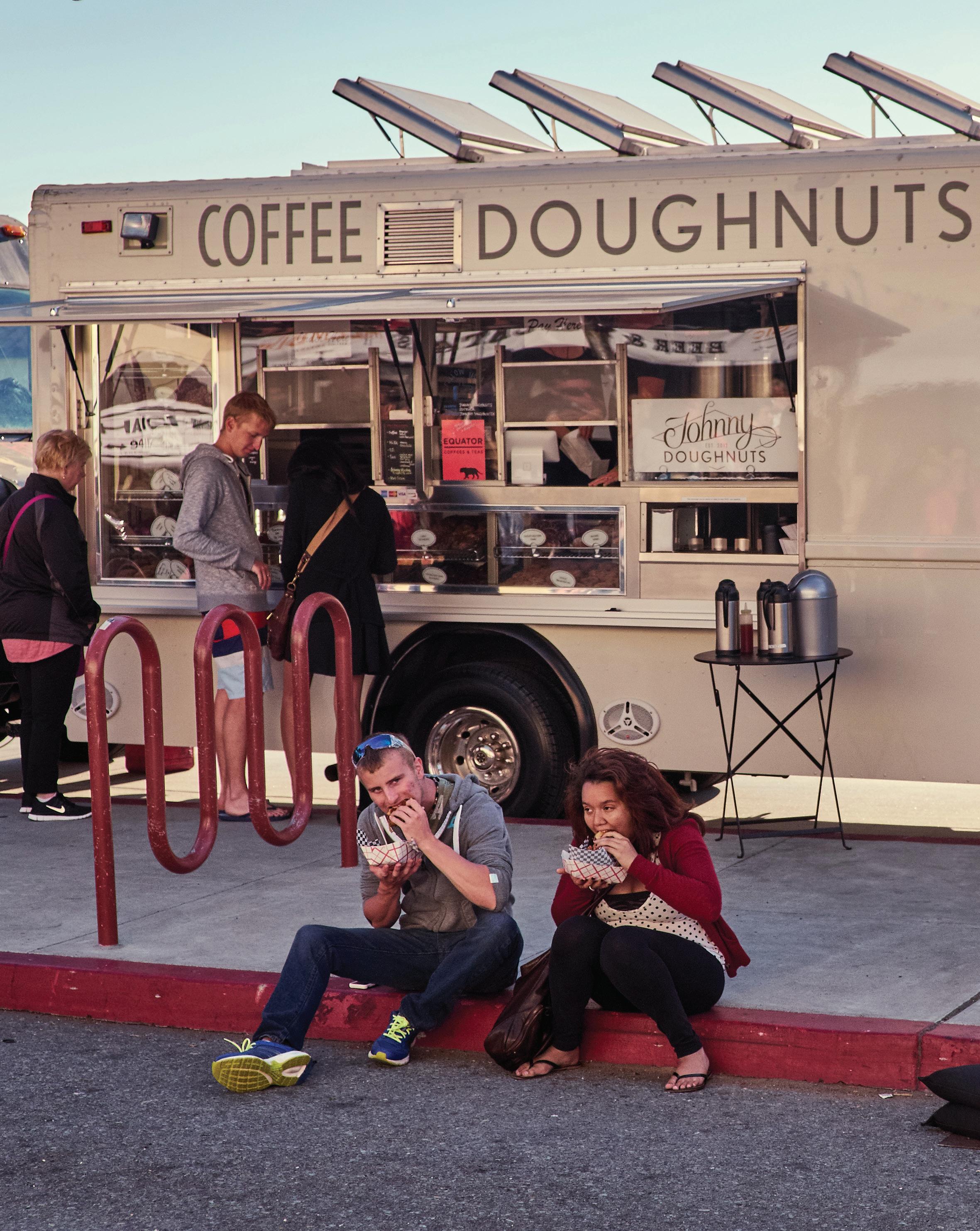
Drivingthrough thelongintricate roadsof Austin’sfood truckindustry asits popularity beginsto soar.
Customers line up at food truck, Johnny Doughnuts, located in the Off the Grid: Fort Mason Center, a food venue with dozens of gourmet food vendors offering unique culinary experiences. Image courtesy of Karlis Dambrans.
The fragrant smell of sizzling bacon and egg on the grill, ready to be paired with the classic cheese and biscuit along with the bubbling of the potato slices cooking in hot oil filling the air with noise. Or the sweet warmth of freshly baked cupcakes coming out of the oven door. The clinking of crystal clear ice hits the rims of the cup floating in a body of sweet, bubbly Coca-Cola as you make it to the order window of the truck. The dozens of mouth-watering aromas and distinctive sounds dance in an enclosed kitchen on wheels. You peek your head out of the small window to greet the customer and record their order with the kitchen just behind you waiting to work and everything within arm’s reach. Standing in the truck of your sheer hard work, you are reminded of the prideful achievements and successes that the journey of owning a food truck has brought you as well as your raw effort and countless challenges along with it.
Austin has been recognized time and time again for its extravagant food community and even received the title “the food capital of Texas”. Many culinary pursuers throughout the nation, not only in Austin, Texas, have begun to discover and promote contemporary ways of serving customers; one of the most popular and well-known being food trucks. As early as the 1990s, food trucks have continued to fill the city streets; uniting the city’s Austinites through their common love and need for food. All over Austin, chefs serve their affordable and unique cuisine in the back of mobile trailers. However, although food trucks have become a popular source of inexpensive, yet comforting food for Austin city, many are still unaware of the unseen efforts, challenges, and influences that arise from them.
Starting the Engine
Almost every Austinite, probably even you, has gone to a food truck at least once. Over the past decades, the presence of food trucks
has made a hasty up climb in the city’s thriving culinary scene, making it one of the primary methods of dining out for the majority of the city. But what makes food trucks so popular and appealing to the public crowd?
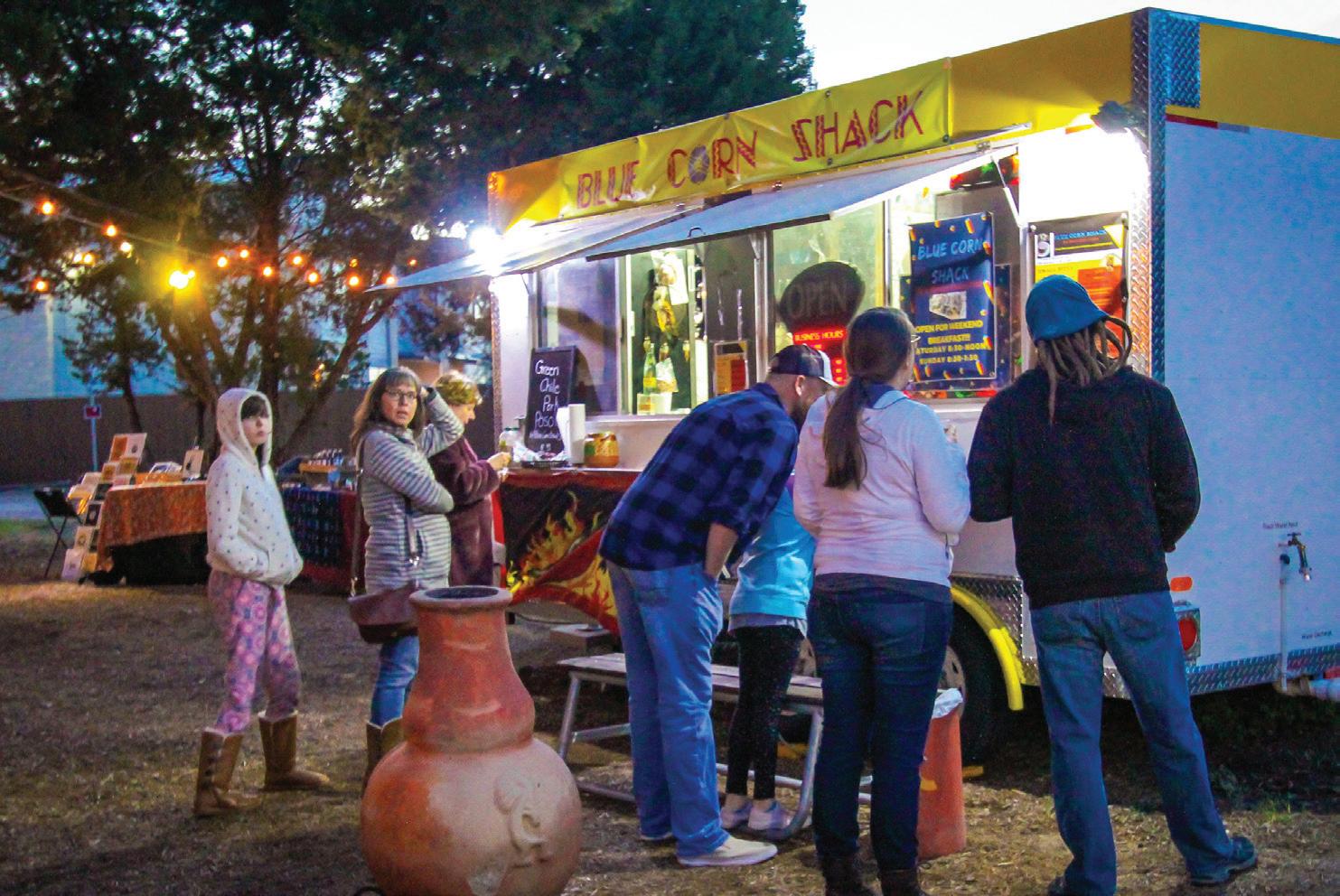
Adam Diaz has been prominently involved in the food truck industry for years on end through owning and running south Austin’s Thicket Food Trailer Park, which opened in 2015. With his familiarity and adept knowledge of the food truck industry, he’s witnessed the crowds of people come and go over the years and the evolution of the culinary industry. He shared his insight on the growing popularity of mobile food trucks, with his experience of working with dozens of different food trucks.
“Austin is like a melting pot,” Diaz said. “There are all different types of ethnicities here and different cuisines. Austin has been able to be good at bringing that to a community because of the demographic here. But people love food, people need food every day. We have people providing good food, different types of food, and innovative food.”
Food and the culinary arts are the daily necessity of all humans, it is the common connection between everyone in Austin and the world. Cuisine is one of the everlasting constants through communities and people and a connection between people of the same culture. Worldwide, ethnicities and cultures have different traditional cuisines and dishes. Differing spices, meats, flavors, and presentations are utilized to create contrasting, unique dishes that are distinct to its culture. However, Austin combines all that into one city. As Diaz said, Austin is filled with countless cultural foods, including the infamous
A line of customers wait to order delicious New Mexican Cuisine from the “Blue Corn Shack” food truck at the Thicket, a food trailer previously located within the park. Photograph provided by the Thicket.
Texas Tastings | 6
”Austin is like a melting pot. There are all different types of ethnicities here and different cuisines. AND people love food, people need food, every day. We have people providing good food, different types of food, and innovative food. Then out of trailers.”
Tex-Mex of Texas. The variety in cuisine with the addition of the low prices, high-quality cooking, and easy accessibility food trucks offer makes them a huge appeal to the public eye.
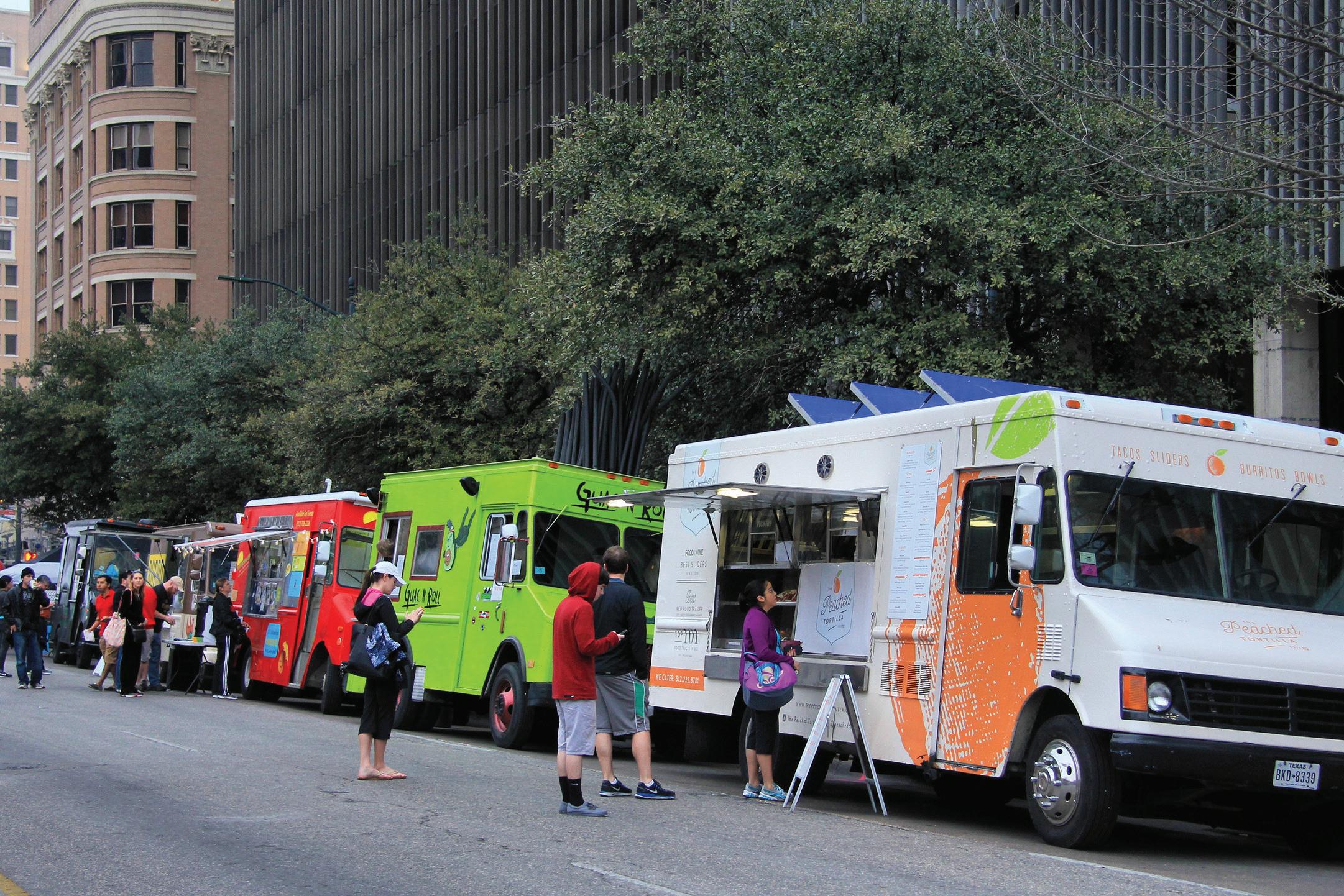
Diaz also stated “It’s easier for people to [own a culinary business] out of trailers [and trucks] compared to brick-and-mortar because not everyone can afford the loans to get into a brick-andmortar. That’s why there are more food vendors out there in mobile than they are in brick-and-mortar.”
The low expenses of starting and maintaining a food truck make the mobile food business one of the best, practical options for many aspiring entrepreneurs and culinary professionals, compared to a brick-and-mortar operation. For many endeavoring future-restaurant owners, food trucks are also the first step to their ultimate goal of operating their own restaurant, as mobile food trucks are considerably easier to kick off and open a road to a larger operation in the future.
Janelle Romeo, who is the owner and founder of the popular Shirley’s Trini Cuisine food truck on East 6th street, said, “I think that food trucks are a great place for people in the culinary field to start if they want to know what that experience is like before opening a restaurant. Because opening a
restaurant is a huge investment, it’s a lot of work, and it’s a big risk, but the risk is definitely not as great when it’s a food truck.”
The food truck game involves less risk when it comes to jump-starting a business; there are fewer investments, commitment, and expenses going into it, but also, it provides an opportunity for many to test run what it’s like maintaining an establishment involving the culinary arts or it can also serve as the first step of one’s much longer, further goal of building up to something bigger. Many of the classic brick-and-mortar restaurants Austin residents consider to be the heart of the city’s culinary experience originated from a small food truck and eventually grew to hold the influence they do now. Romeo said “I think food trucks are an important part of that because so many of the staples that you know are places that started off as food trucks. For example Torchy’s, he started off as just one food truck on South 1st. Peached Tortilla started off as just one food truck. A lot of places that we know now started off as food trucks.”
The Long Drive Ahead
The first, and one of the most important, steps for many food truck vendors, or entrepreneurs in general, is having a motive: a goal or idea that one pushes themselves to work towards. Many food vendors
share similar motives and visions for their food truck businesses, while others have more unique and personal reasons for starting. However, each and everyone has their own personal objective for their future that acts as their main motivation.
Eric Silverstein is the owner of the award-winning multi-restaurant company, The Peached Tortilla, which was originally founded in 2010 as one single food truck. Since that year, his business has grown from one single food truck to a successful brick-and-mortar restaurant, catering, and food truck company.
When starting his food truck journey, Silverstein shared his main motivator and vision as he was starting out, pushing through the more difficult times of the job, and even during the pandemic when business for many food trucks almost disappeared. He said, “I was always chasing the brick-andmortar goal. I was chasing that from day one. What kept me motivated during the pandemic and in general was more just personal for me, internally. I didn’t really want to fail. It was a lot to lose. It would be tough to walk away from all these different businesses and just give up. So you want to keep pushing and things gradually got better.”
Like many other food truck business owners, Silverstein has been after his vision of building the Peached Tortilla into a brick-andmortar restaurant with real walls. However, what may or may not be unique to him, is his motive to succeed, having put in so much effort and hard work already, it would be a huge loss and pain to give up years of investment just like that.
The streets of Austin are lined up with various food trucks serving unique cuisines during the Austin marathon in 2014. Photographed by Larry D. Moore, CC BY-SA 4.0, Wikimedia Commons.
Silverstein also shared one of his biggest tips for starting a food truck business and said, “I would just make sure you have an end game, what are you trying to achieve? If you’re just trying to achieve a food truck, it’s probably a hobby. It’s very tough to support yourself on just a food truck. It’s not really a long-term play. So what is your goal? Is your goal to create a restaurant? Is it to create a catering company? Is it to create a brand for consumer packaged goods?”
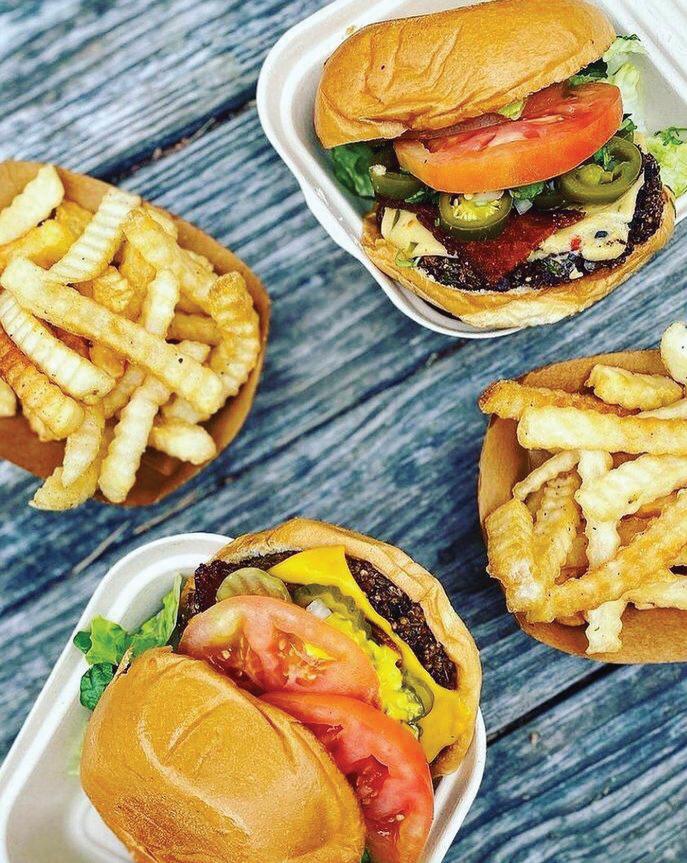
He described the importance of a driving goal when one is starting a food truck and how knowing your ultimate want can open a path to plan for the future.
However, for Janelle Romeo, the owner of Shirley’s Trini Cuisine, her personal drive and motivation differs greatly from owners like Silverstein. “I have always wanted to bring part of my culture to Austin because being from Trinidad and growing up here, I was stifled culturally. There was nothing for me culturally here…Any opportunity I could get to fly back to Trinidad, I did. There were some years that I would go back four times, and that’s not cheap.” said Romeo. “But growing up, trying to figure out who you are, what your purpose is, and what your place is in the world, it’s important to connect with your heritage…Then part of my mission in life was
always to bring my culture into Austin because I didn’t want other people that came here as kids to grow up feeling the way that I felt…I really wanted to share my culture with Austin and make some of my home here, because this is also my home, but I was always torn between my two homes. I want to love where I live just as much as I love where I’m from.”
Through her cooking and food truck, Romeo’s goal and wish was to share her unique culture with the people of Austin. She wanted to create a community of people of the same culture that would provide comfort and cultural validation for herself and others who, like her, didn’t have an opportunity to live with their culture in Austin.
“Since opening my truck, I have met so many people that say the same thing that I said my entire life growing up here is they felt alone, they felt like there was no one else here like them,” Romeo said. “People just come to my truck to hang out and sometimes talk because they just need someone that understands where they’re coming from.”
With this vision in mind, she has been able to touch the hearts of many who were deprived of the same cultural affirmation from the Austin community just as she was. Her food truck has become a
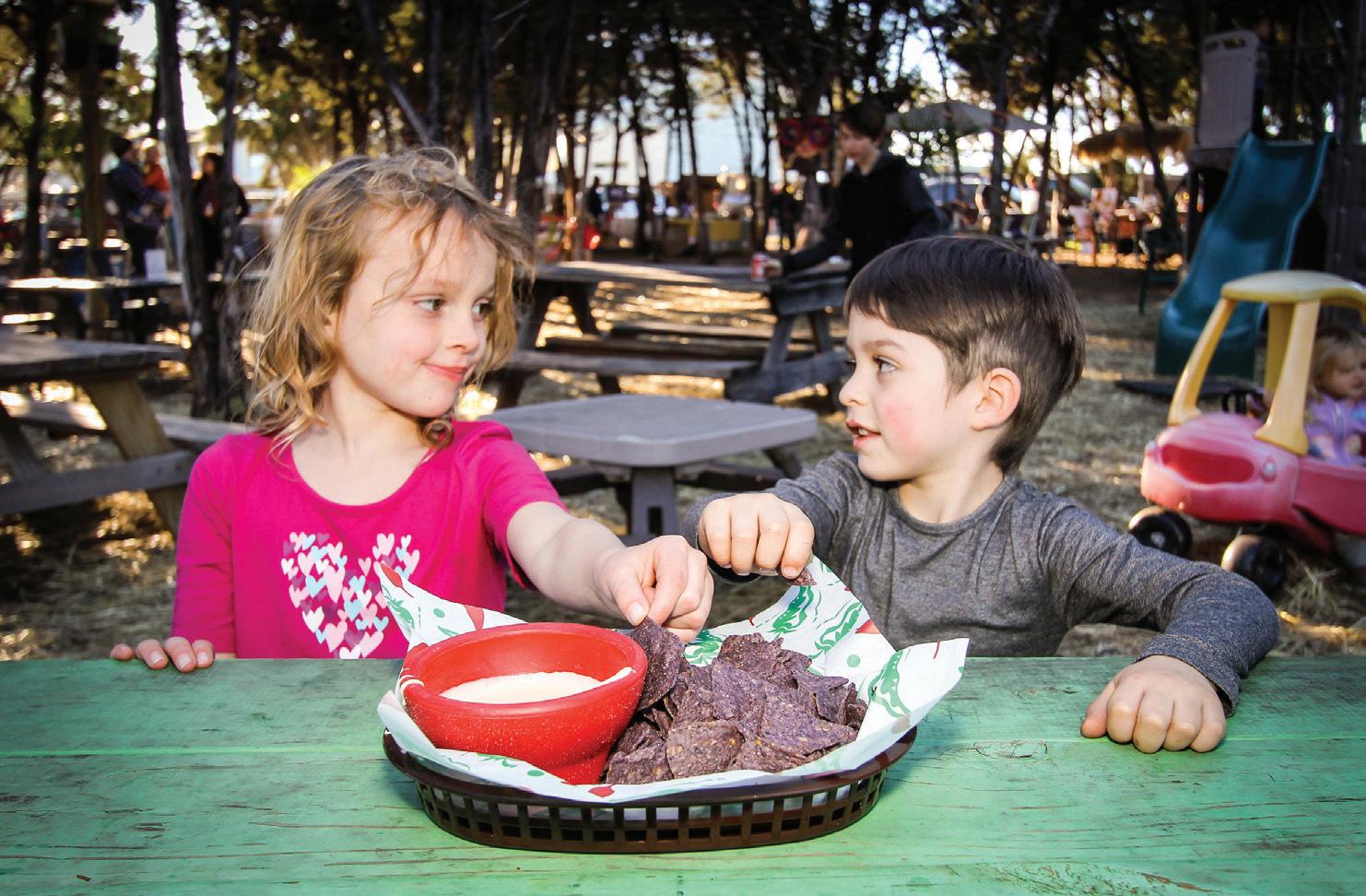
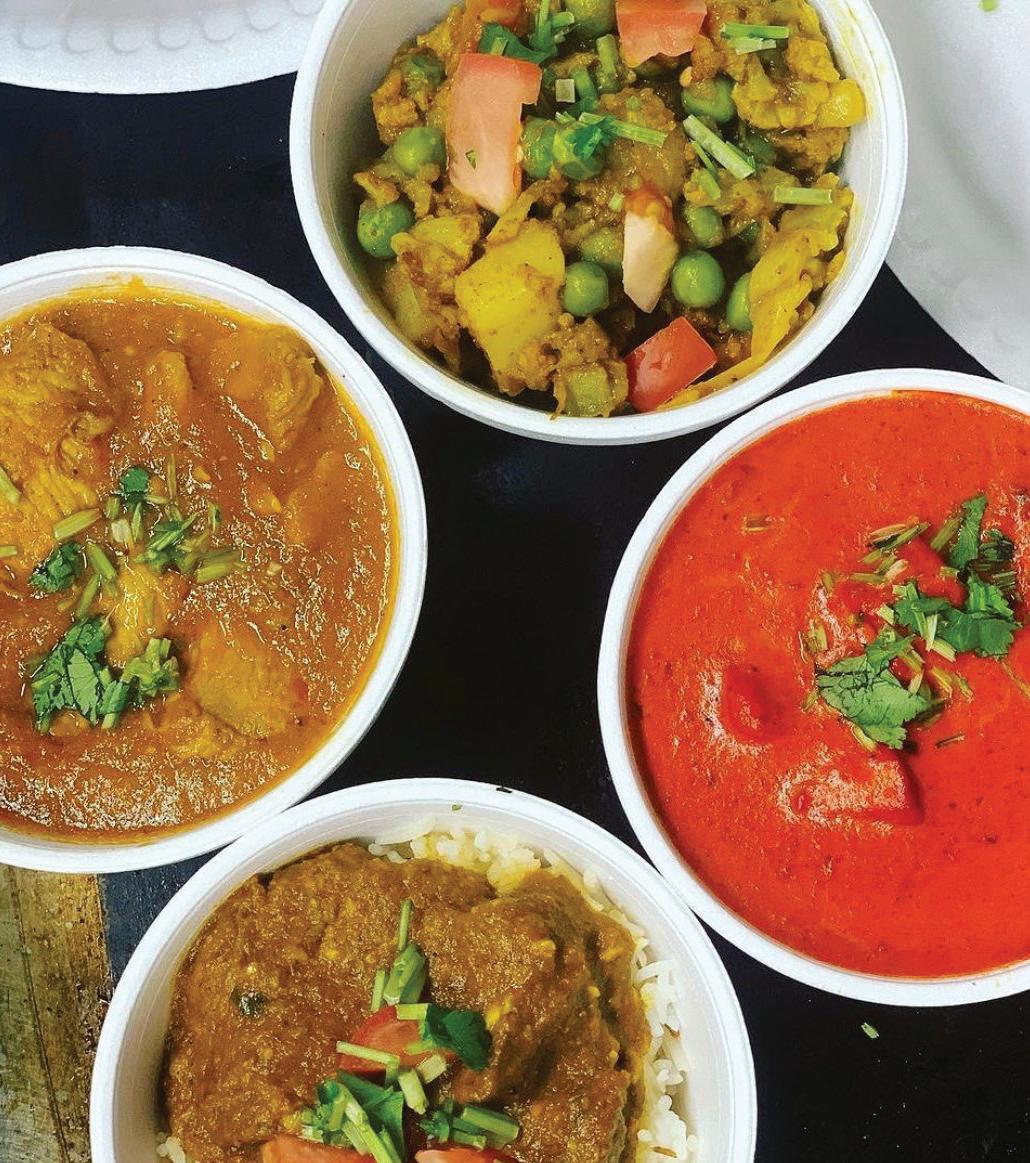
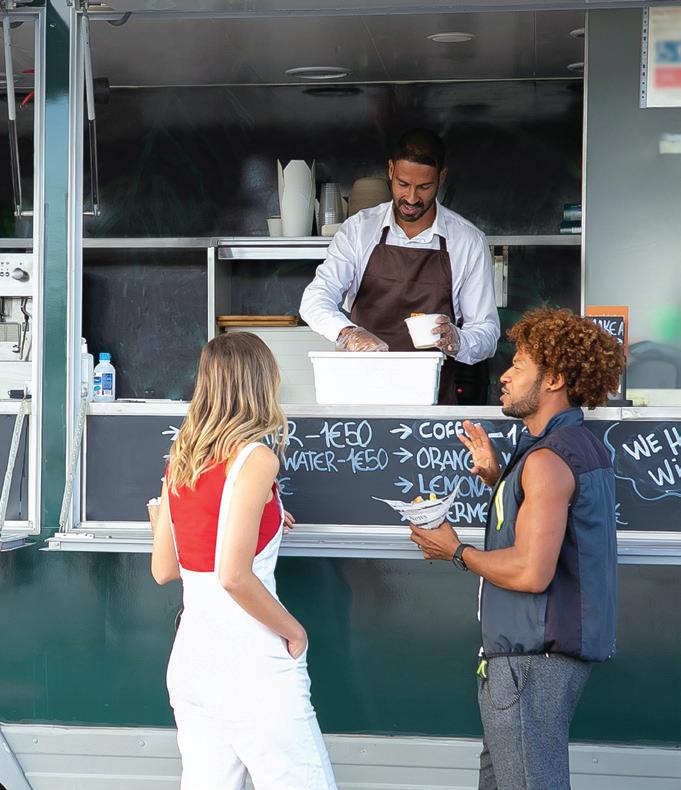 Photo courtesy of Thicket Food Trailer Park
Photo courtesy of Thicket Food Trailer Park
Photo courtesy of Creative Commons
Photo courtesy of Thicket Food Trailer Park
Photo courtesy of Thicket Food Trailer Park
Photo courtesy of Creative Commons
Texas Tastings | 8
Two children, while their parents are visiting the Thicket, share a bowl of nachos in the dining area of the park. The bright lights and homey furniture give the park a very cozy, warm feel. Photograph provided by the Thicket Park.
source of support and comfort for many Trinidadians seeking a place to reconnect with their culture.
An Odd Time
The COVID-19 pandemic hit the world like a tidal wave, sudden and in unprecedented ways. Cities all over the world including Austin shut down completely and people were isolated in their homes. The chefs and entrepreneurs in the culinary community each had their own unique, but also similar experiences. For some, the pandemic brought great despair to their business and built a giant obstacle for them to overcome. Others said the complete opposite and stated that with the help of the pandemic they were able to grow and advertise their business even more.
The founder and owner of the Thicket Food Trailer Park, Adam Diaz, shared how his park was influenced by the unexpected pandemic and the conditions the truck vendors were put under. “I would say, in general, we grew during the pandemic,” Diaz said. “People couldn’t go into restaurants, couldn’t go into buildings very easily. They can go outside and hang out a little easier.”
For Diaz and most likely many other food truck owners, the pandemic provided him with an opportunity to expand his park and actually gain more revenue, when
most would expect the COVID pandemic to carry negative impacts for the majority.
During the pandemic and amidst the long quarantines and lock downs, the people of Austin city needed safe places to enjoy outside of the homes they were trapped in 24/7, while also being able to social distance. Therefore the majority of Austinites could not enter buildings, especially restaurants, where tables were no more than 5 feet apart and dozens of people dined under the same roof. In addition, grocery shopping and cooking every day was also a major hassle for many
people, so take out and dining in posed as a more convenient option. This paved the way for food trucks to make their way up to the go-to dining-out option for many families, as all food trucks were located outdoors in the streets and the majority of them served inexpensive and affordable cuisine.

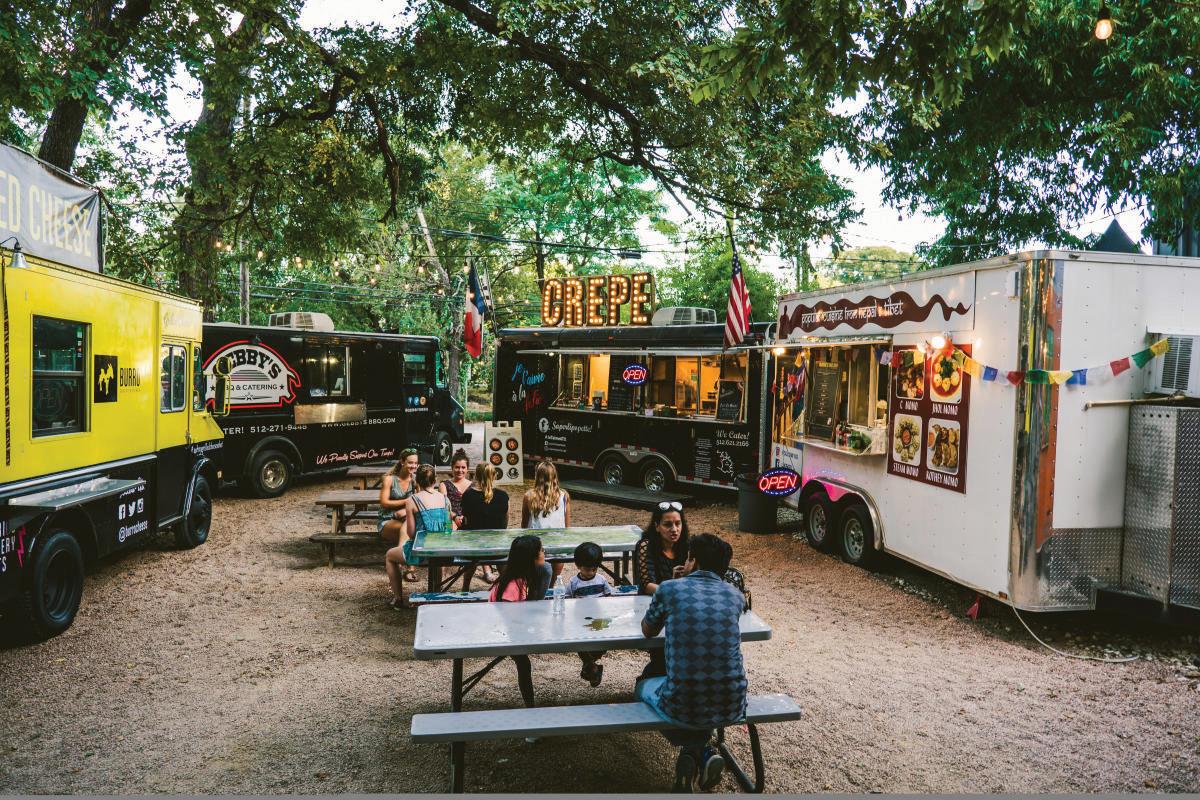
Janelle Romeo, the owner of the sensational food truck, Shirley’s Trini Cuisine, shared her personal experiences during the pandemic which aligned with the story of Diaz and the Thicket. Romeo had started her successful food truck business during the pandemic, making it even more impressive how her truck has gained so much popularity. “The pandemic actually made it easier because at the time no one could have gone to restaurants,” Romeo said. “Everyone was relying on food trucks. And then not only that, our food truck was in a park and they couldn’t close down parks. Parks were one of the things that people could go to and still sit and eat.”
However, unlike the experiences Diaz and Romeo shared, many food truck vendors suffered through the negative effects of COVID-19.
Eric Silverstein, the owner of the award-winning Peached Tortilla restaurant and food truck company, was one of the ones who were forced to swim through the diffi-
A father holding his daughter in his arms orders at the counter of a food truck with a long line waiting behind them. Photo courtesy of Creative Commons.
People seated at picnic tables in a food truck park waiting for their delicious food to be served to them. Photo courtesy of Creative Commons.
cult waters of the pandemic. Along with the beginning years of starting the business, he described the pandemic and said “I wouldn’t say it’s ever been easy. I would not use the word easy to describe pretty much anything in the last 12 years. I would say there’s been less difficult times and there’s been times that have been stable. But coming off a pandemic like that, it’s been tough.”
The act of adapting and dealing with the major effects of the pandemic was also a huge struggle both for his business and himself. Silverstein stated “You’re forced to adapt, and when you’re in the moment, there’s really not a whole lot of time to feel sorry for yourself. You’re just trying to figure out how to save your business and not run out of money.”
He was forced to be pragmatic and wise with his choices as the pandemic almost shut down his entire business. The day they decided to close the Peached Tortilla he said he had felt it coming. Business had started slowing down with fewer and fewer customers entering the store. By the weekend, the business was completely dead and he decided to close. He was faced with the tough decisions of what to prioritize financially and in the end, he had to let go of some employees. Silverstein said, “When you don’t have a dining room at either restaurant, and you have literally zero catering, what can you do? There’s nothing to do. We lost a lot of people, they never came back, and they switched careers. What we saw during COVID is unprecedented, the world has changed maybe forever.”
The food truck industry like any other business is filled with success and accomplishment, but also struggle and raw effort. As the streets of Austin line with more and more rows of creative food trucks and the people of the city are given even more opportunities to experience exquisite foods, those food truck vendors will have to deal with struggles and obstacles along their path to success and those who make it through with tenacity will reap the pride of their well-earned success.

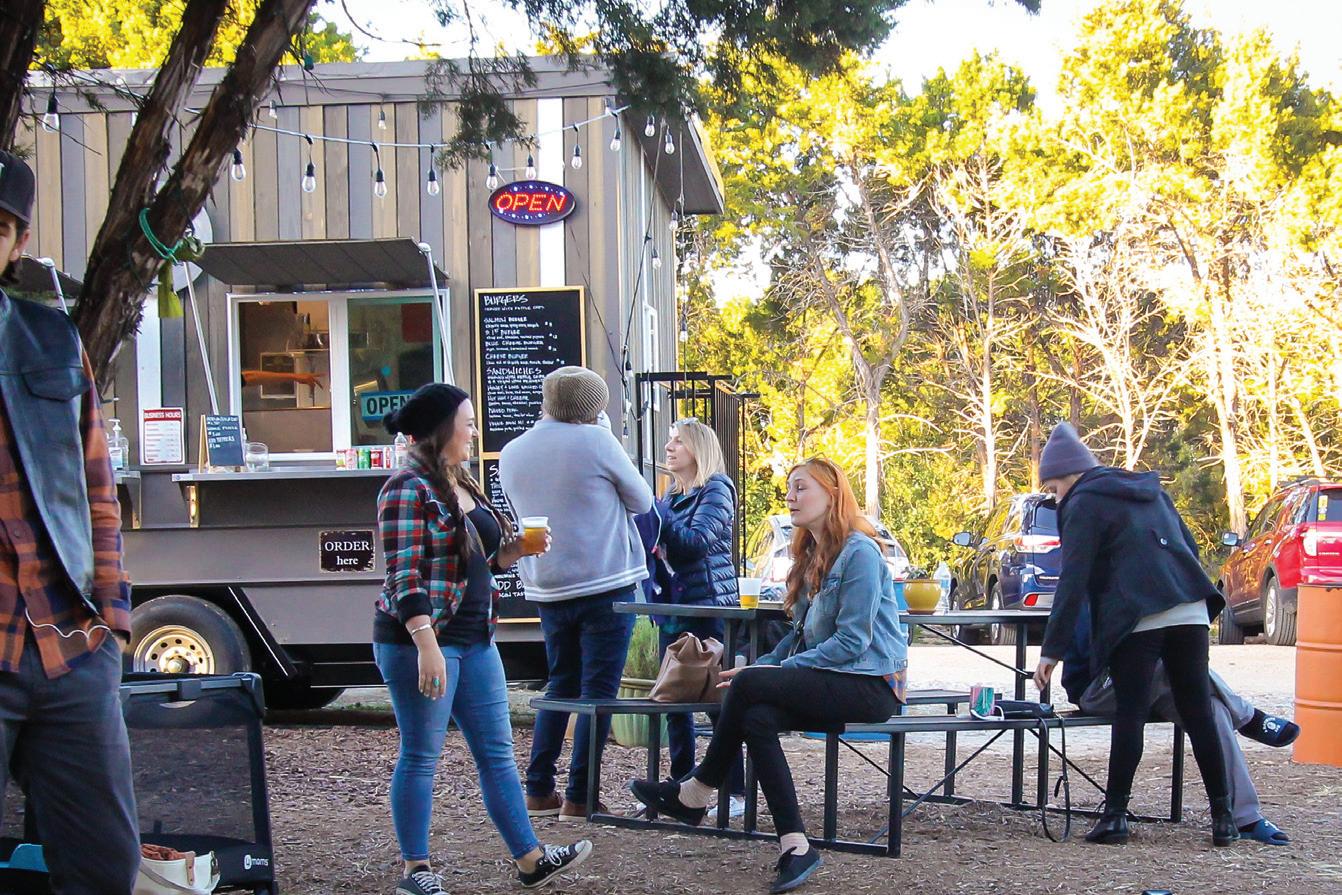
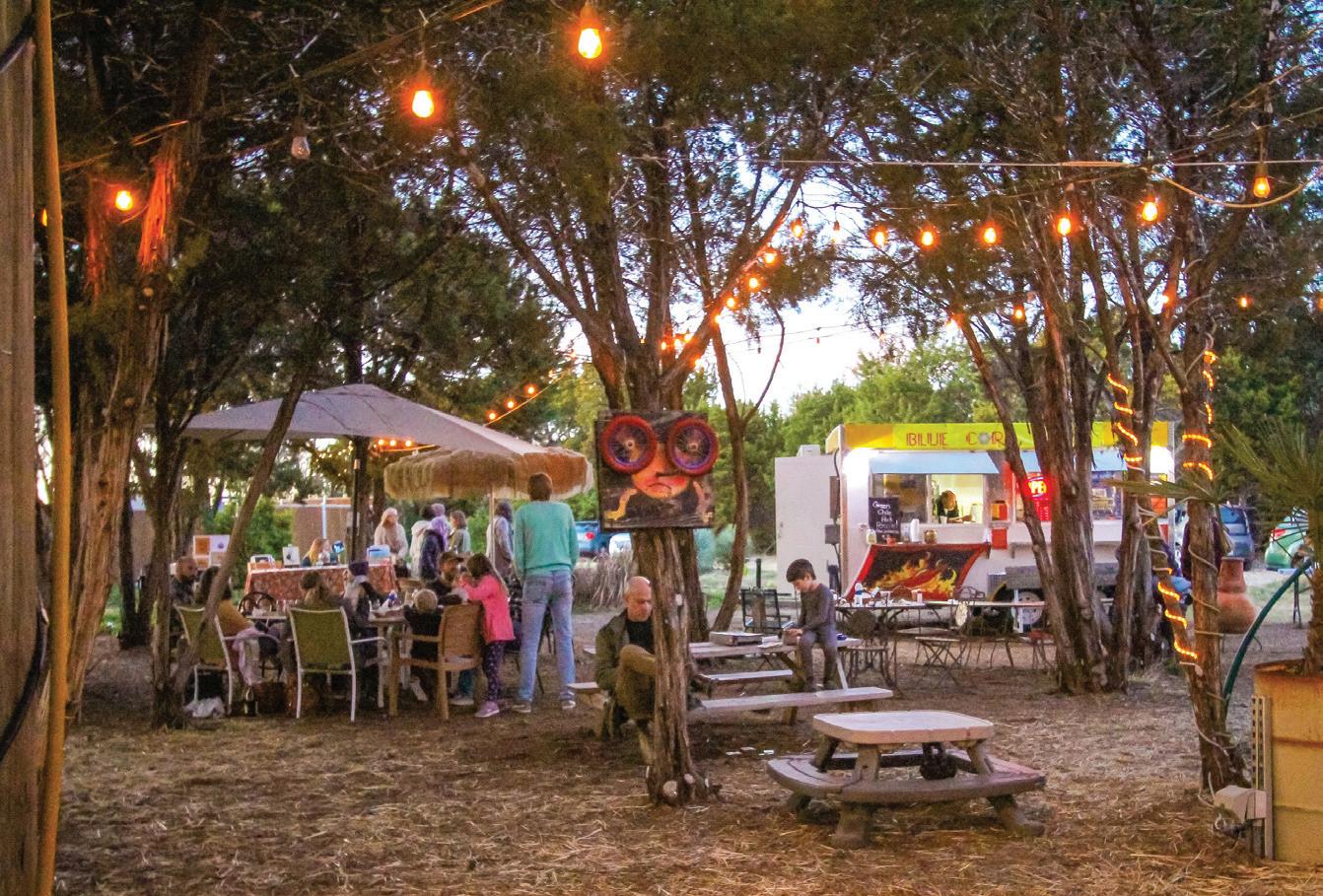
Texas Tastings | 10
The lively atmosphere of Thicket Food Trailer Park. Photos courtesy of the Thicket.
BESTFOODTRUCKS
Information provided by Yelp, Google Maps, the respective businesses’ websites, Statesman, Community Impact, and a survey of LASA students.

THE PEACHED TORTILLA

5520 Burnet Rd #100, Austin, TX 78756
The award-winning Peached Tortilla started as a fo od truck, and still is one, in 2010. The founder, Eric Silverstein, was inspired by the Asian and S outhern cuisine that he grew up eating and incorpo rates these cultures’ cuisines in his dishes. Over the past decade, the Peached Tortilla has grown into a multi-restaurant, catering, and fo od truck company. The fo od truck serves cuisine ranging from the classic Texan tacos to the well-known Asian staples such as fried rice and p ork be lly.
CONSCIOUS CRAVINGS
1311 S outh 1st St, Austin, TX 78704
Lo oking for a healthy, vegan, and affordable fo od choice in Austin? Conscious Cravings is the way to go! Conscious Cravings is one the b est vegan fo od trucks in the whole city of Austin, serving high quality dishes. Their menu has a colorful selection of wraps, salads, smoo thies, and more. Their most p opular and favored item is the Indian-style spicy chickp ea wrap.
 By Isabel Liu >
By Isabel Liu >
SHIRLEY’S TRINI CUISINE

1606 E 6th St, Austin, TX 78702
Shirley’s Trini Cuisine fo od truck is one of the only places serving authentic Trinidadian Food in Austin. Through her fo od truck, Janelle Romeo, the founder, aims to share her Trinidadian culture and provide a comforting community for others.
Shirley’s Trini Cuisine offers a raw taste of Trinidad’s culture with fragrant fo od and music.
HEY, CUPCAKE!

4209 Airp ort Blvd, Austin, TX 78722

Hey, Cup cake! op ened in 2007 and was founded and eventually sold to another owner by Wes Hurt. Hey Cup cake! has stayed an icon in Austin’s foo d truck scene over the years as it was one of the first to app ear on the streets. The menu has a limited, but delicious selection with a variety of creative and appe aling cup cake flavors.
THICKET FOOD PARK
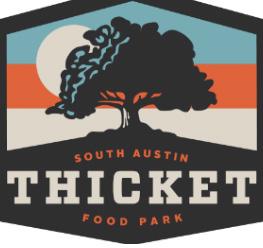
CHI’LANTRO
1509 S Lamar Blvd, Austin, TX 78704
Chi’Lantro is an award-winning restaurant, mobile food trailer and catering company. The founder, Jae Kim, made an app earance on Shark Tank which b o osted him to pursue his dream of running a Korean Mexican fusion fo od truck in 2010. Since then, his business has b een a bo oming success with over 10 restaurant loc ations now op en in Austin! The most recommended and p opular item are the world famous Original Kim chi Fries.
7800 S 1st St, Austin, TX 78745
The Thicket Foo d Park is home to over a dozen fo o d trailers each catering their own cuisine genre. Adam Diaz, the founder of the Thicket, aims to maintain a strong sense of community in the park and to bring pe ople together over their common love of fo od . The Thicket offers a great place to taste amazing fo o d while enjoying the outdo ors and various
Texas Tastings | 12
A Pinch Of Salt
By: Atticus Saether
Being a chef can be an aspiration for most people. For many, it is something that they would like to explore. As people learn more about the field, they start to become more interested in the way that chefs run things these days. As I interviewed some of Austin’s best and most well-known chefs, I learned a lot. From what goes on behind the scenes, all the way to how the restaurant keeps in business. The interview that stood out to me the most, was my interview with Guy Villavaso. He is one of the owners
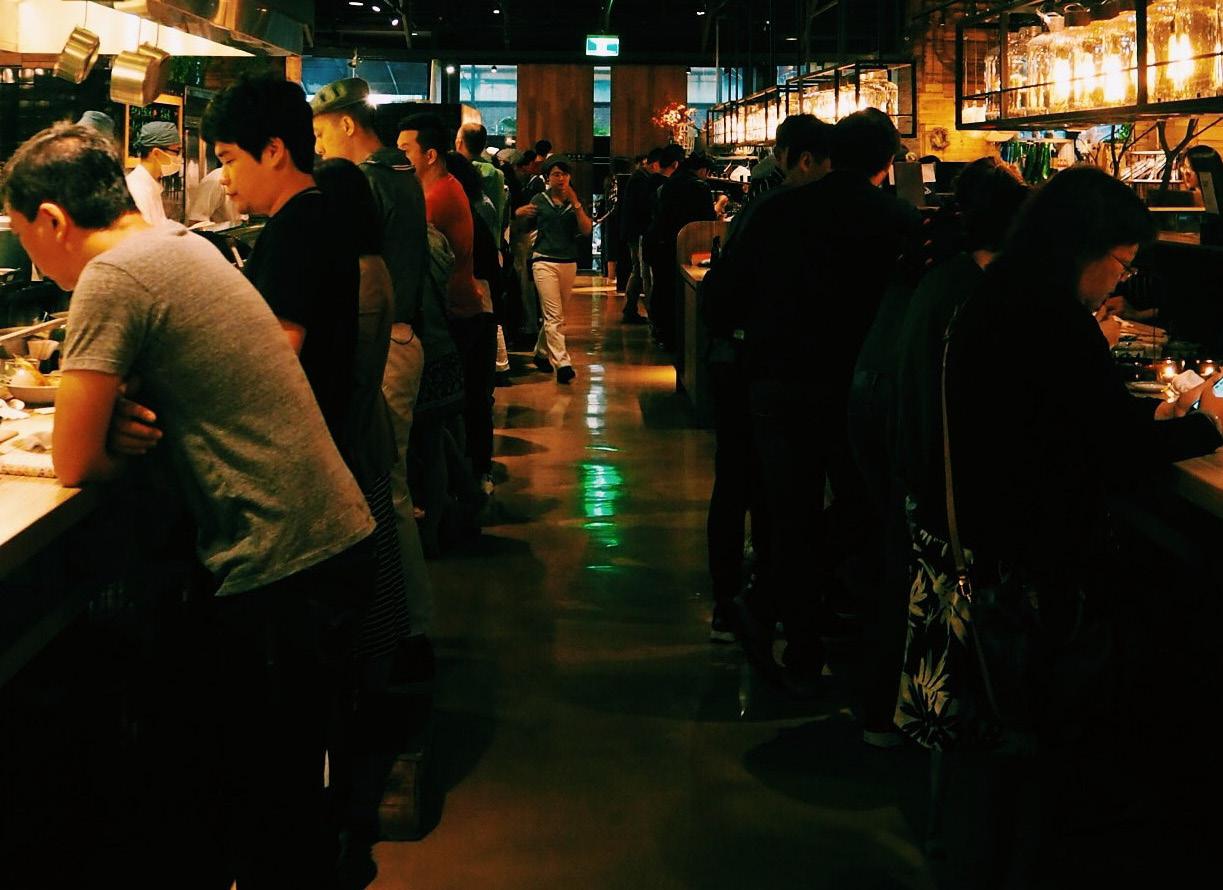
of Hopdoddy burgers, and I found it really interesting how he started up one of the most well-known restaurants in Austin.
Throughout the interview, he mentioned that “the original South Congress location was where it all started.” That’s when the restaurant started to get more well-known. After the first location had so much success, they opened a second, then a third, then a fourth and they currently have twenty-two locations, five of which are in Austin. Something that Austin is often noted for
is its diversity in culture, especially when it comes to food. A great example of this would be some of the Asian restaurants in Austin. To further explore the secrets of Japanese cuisine, I interviewed Aikawa Tatsuya, the owner of Ramen Tatsu-ya. He is the proud owner of over ten awards from the “best of Austin” category. Ramen Tatsu-ya is the long-awaited collaboration between local chefs/DJs, Tatsu Aikawa and Takuya Matsumoto (Right-middle). The two of them first met as they were busy making their marks on
Typical restaurant in Taiwan
Photo by: Kyle Lui
the Austin scene as hip-hop DJs. After following an uncanny parallel timeline, honing their crafts at notable Austin establishments such as Musashino and Second Bar + Kitchen, Tatsu took a leap and moved to Los Angeles. There, he worked in one of the nation’s most respected Sushi bars, the two Michelin star restaurant Urasawa.
On his return, he began working with Takuya on birthing Tatsu-ya. “I was craving good ramen after having lived in Japan and LA. I wanted to provide that same quality and authenticity in Austin, the city I call home.” says Tatsu. “We want to educate people on what ramen truly is. It’s the soul food of Japan. The process of broth-making can take an extremely long time in order to draw out the flavors from each ingredient.” A far cry from the 10-cent package ramen most of us know all too well.

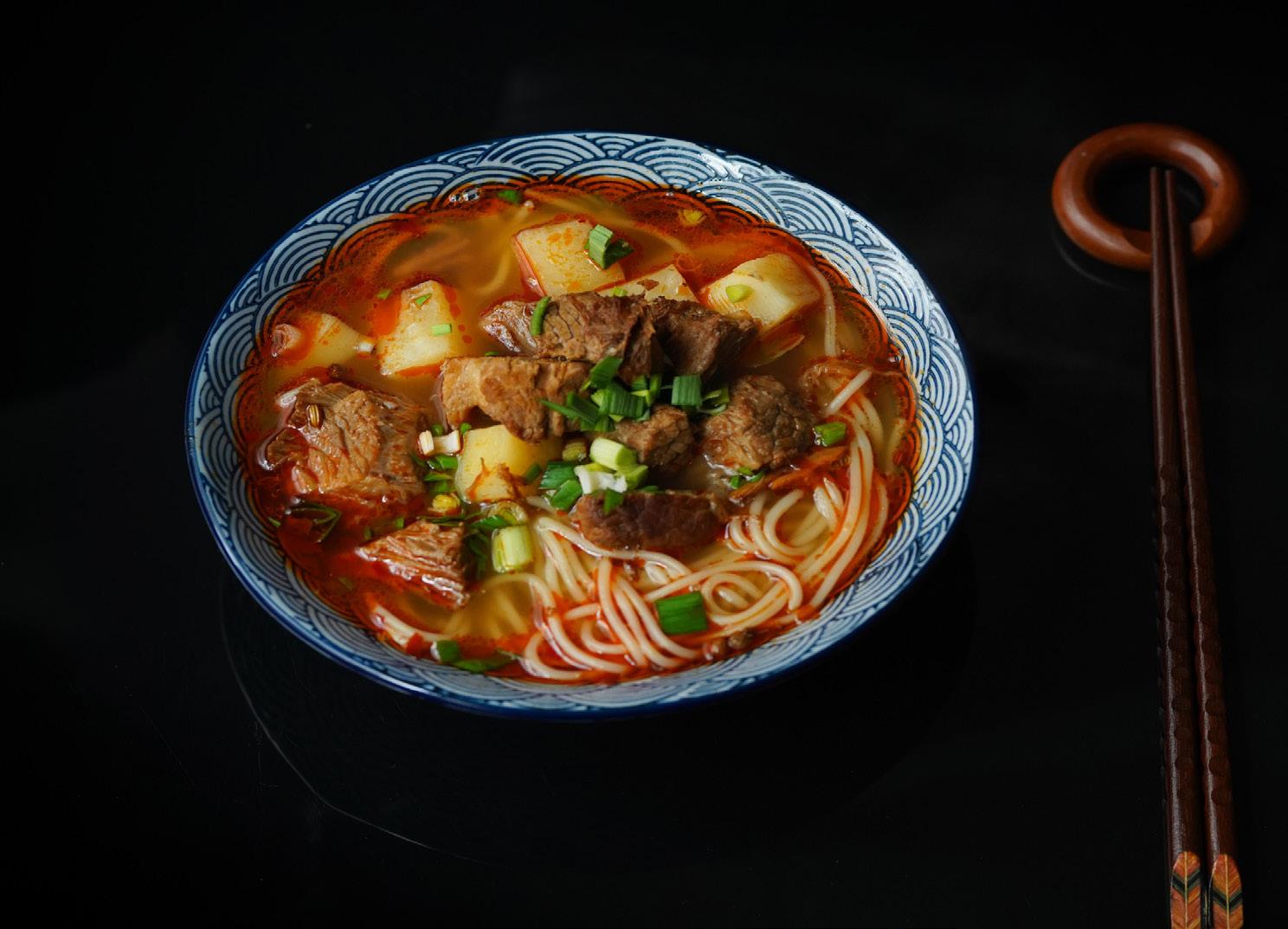
“We try to keep it simple. No reservations, no take-out. I don’t want you to eat my ramen when it’s not hot and has soggy fucking noodles.” says Aikawa.
Lastly, I got the chance to interview the second James Beard award-winning chef, Jesse Griffiths, and his restaurant Dai Due. Griffiths said this about some of the ingredients used in their menu; “We only use food that we can find in our region, so the bounties and scarcities of the seasons are always the themes; we have asparagus for three or four glorious weeks, look forward to the apples in August, and are grateful when we are blessed in the rare year that apricots arrive. We marvel at fall flounder and miss our South Texas limes and lemons when they disappear in the spring. But, they
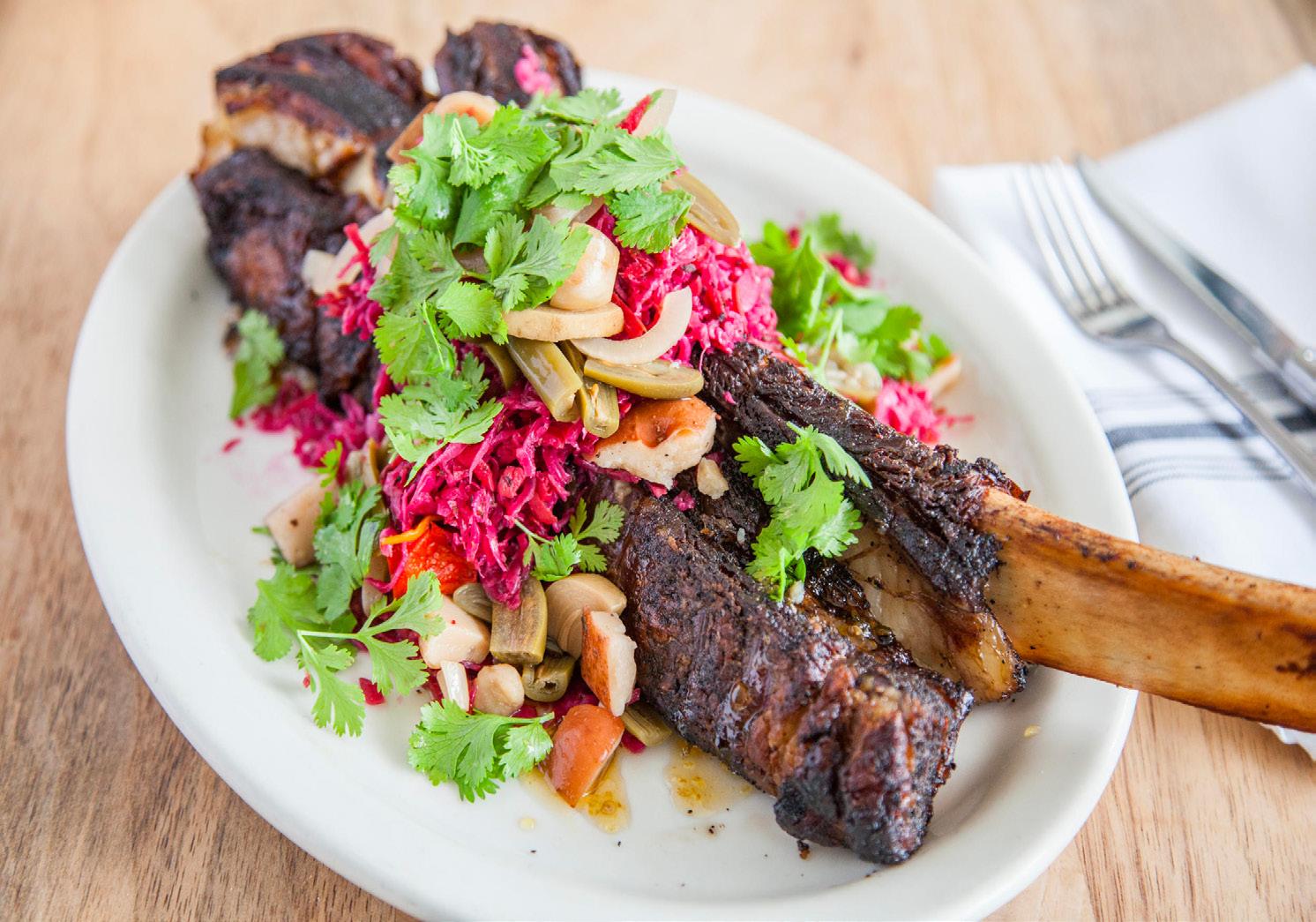
“Two key ingredients in any successful chef: a quick learner and someone with a sharp brain.”
Tatsu Aikawa and Takuya matsumotyo
Photo by: The Austin Chronicle
Texas Tastings | 20
Dai Due’s famous short rib Photo by: Dai Due
Ramen Tatsu-ya’s scrumptous ramen photo by: Mat Kedzia
always come back next year.” “Because of this focus, preservation is key. We dry, can, pickle, ferment, smoke, candy, and freeze like pioneers, and we love the challenge and reward of the infinite puzzle of making food in such a beautiful and volatile place.” says Griffiths.
“We do not use vegetables and fruit grown far away, meats from factory farms, fish that are not from our waters, or foreign cheeses. Our potatoes are certified organic. Maybe we will have a few pistachios from our neighbors in New Mexico from time to time.” almost all of their dry goods and vinegars are certified
organic. They buy mostly organic grains and corn grown and milled in Texas.
Being a chef in one of the most popular and diverse cities can be really hard. Regardless of the fact, numerous chefs have found ways to be successful in Austin and they still continue to be. The amount of cultures and communities that Austin brings to the table provides a blank canvas for new up-andcoming chefs.

Dai Due’s grilled pork ribs
 By: pascal claivaz
Photo
By: pascal claivaz
Photo
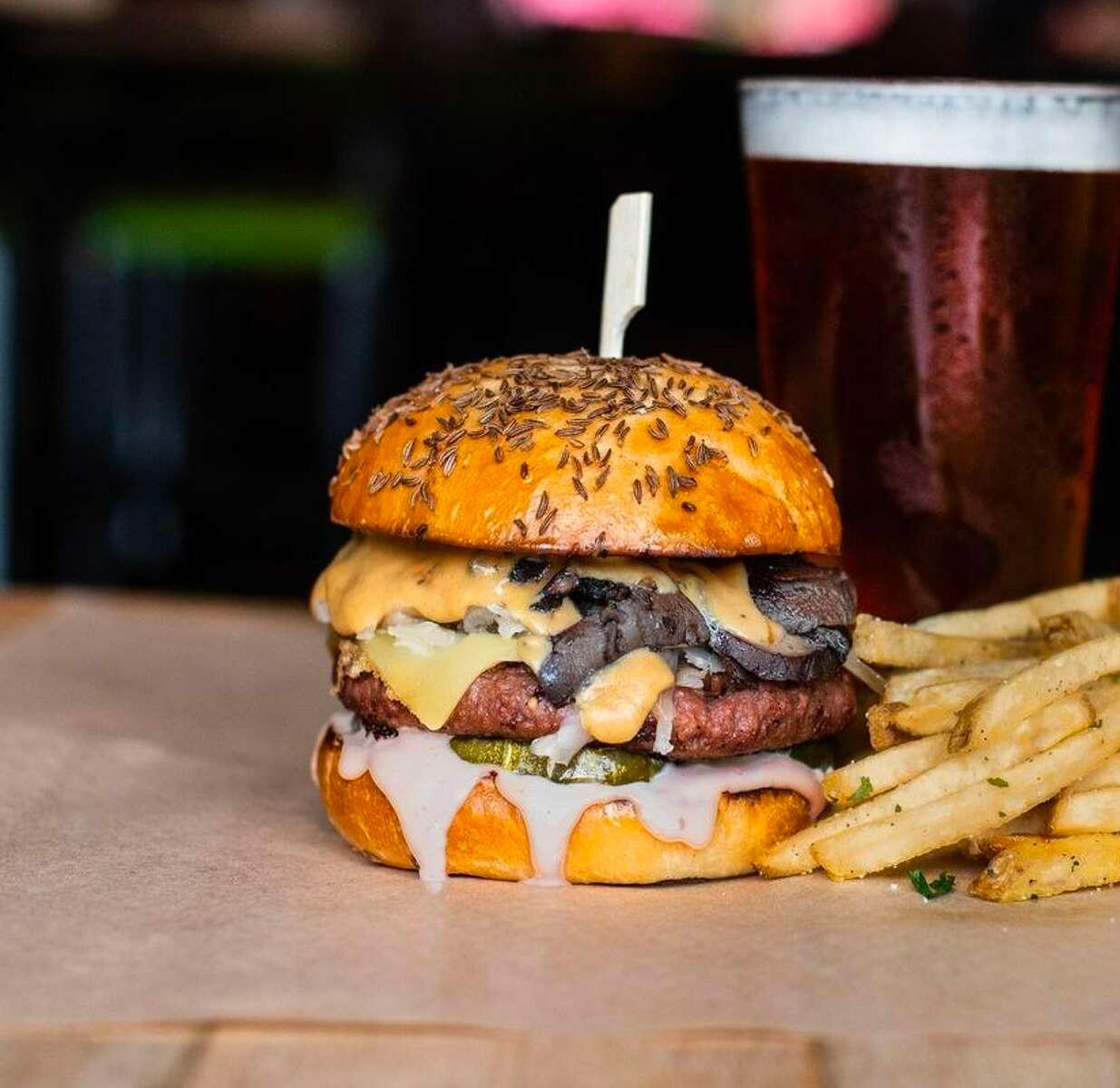 Hopdoddy’s burger bar
Photo By: Chevanon Photography
Hopdoddy’s burger bar
Photo By: Chevanon Photography
Texas Tastings | 22
“We try to keep it simple. No reservations, no take-out. I don’t want you to eat my ramen when it’s not hot and has soggy fucking noodles.”
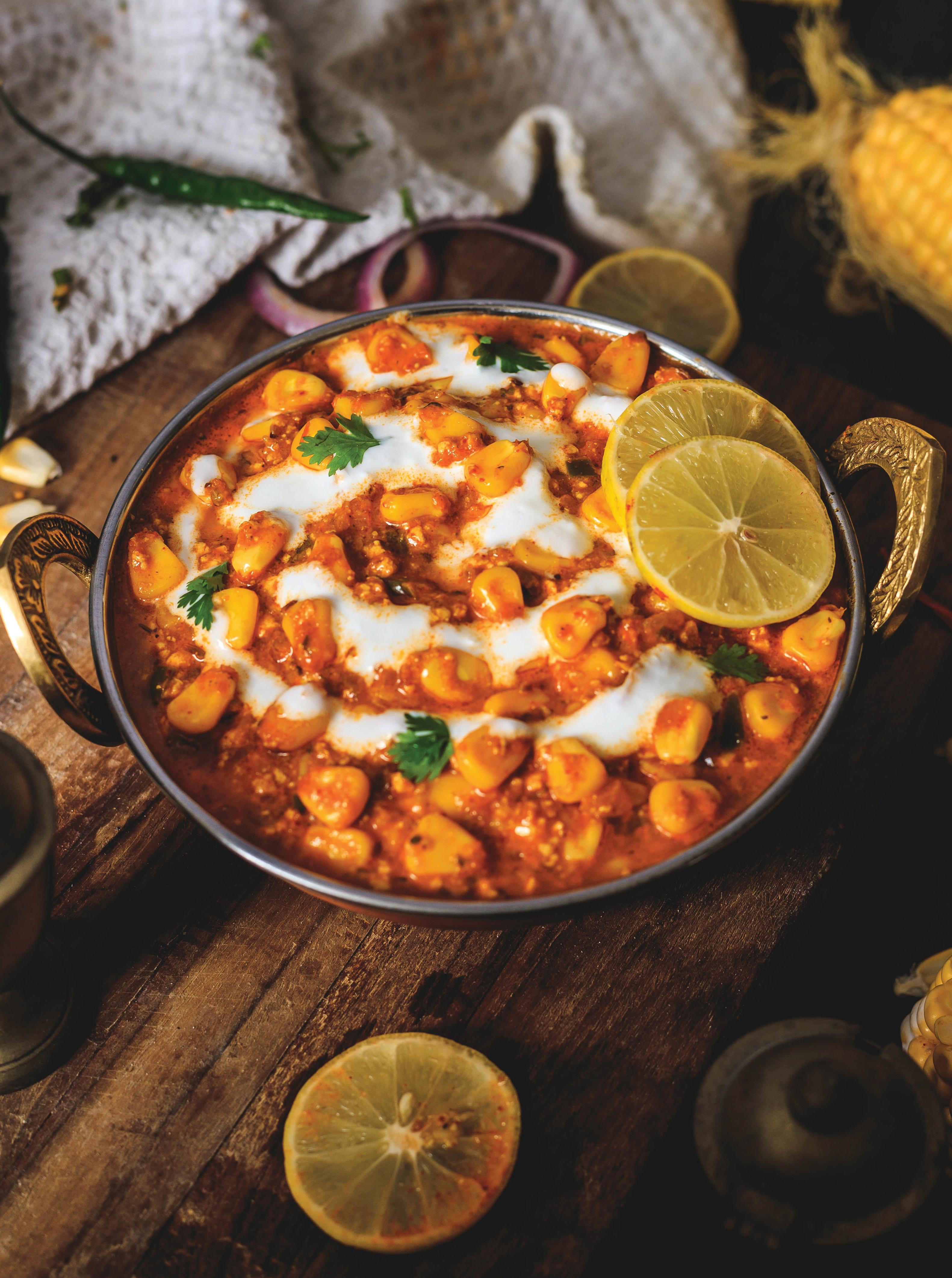














 Photo courtesy of Thicket Food Trailer Park
Photo courtesy of Thicket Food Trailer Park
Photo courtesy of Creative Commons
Photo courtesy of Thicket Food Trailer Park
Photo courtesy of Thicket Food Trailer Park
Photo courtesy of Creative Commons














 By Isabel Liu >
By Isabel Liu >




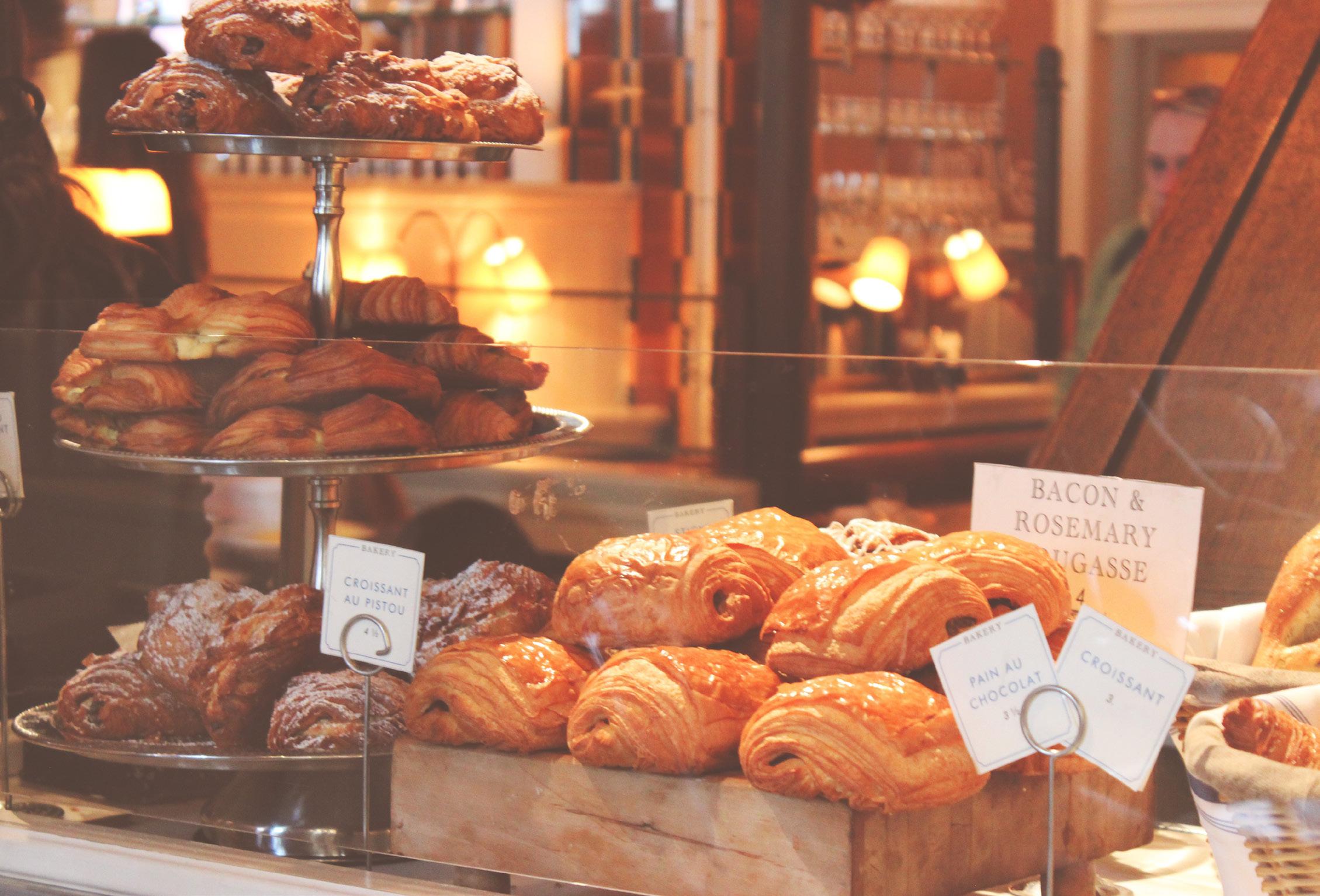


 Extravagant geode cake made by Christy Duffel.
Photo by: Christy Duffel
A hand crafted cake that resembles a Disney castle, made by Christy Duffel. Photo by: Christy Duffel
Extravagant geode cake made by Christy Duffel.
Photo by: Christy Duffel
A hand crafted cake that resembles a Disney castle, made by Christy Duffel. Photo by: Christy Duffel
 A cake dirrived from the website “Unsplash”
A cake dirrived from the website “Unsplash”
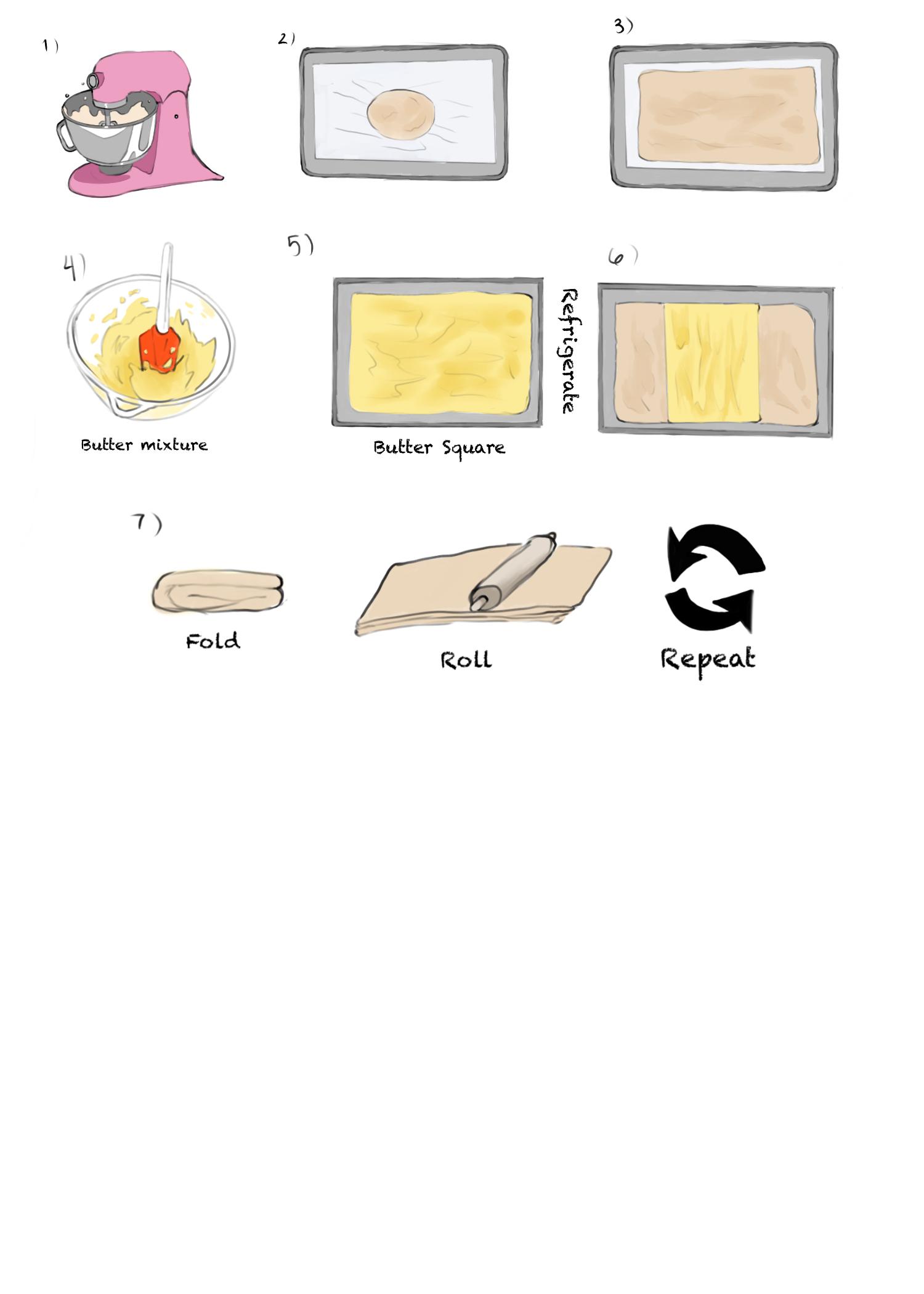







 By: pascal claivaz
Photo
By: pascal claivaz
Photo
 Hopdoddy’s burger bar
Photo By: Chevanon Photography
Hopdoddy’s burger bar
Photo By: Chevanon Photography


